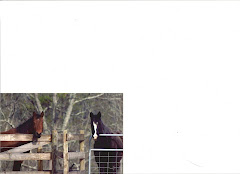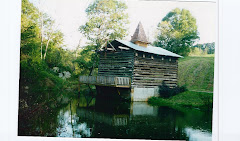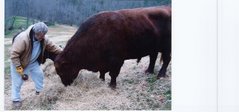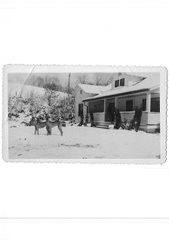Mama came into the living room carrying a small glass filled with water, a comb, mirror and bobby pins. She sat in daddy’s recliner and placed the water on the end table. I watched, as I have watched many times before, as she carefully parted her silver hair into small strands with a wet comb, wound them around her finger, placed the curls flat against her head and fastened them with a criss cross of bobby pins. We sat and talked, drank a little tea and in a few minutes her hair was up and we were ready to go to bed. Mama’s hair would be curly in the morning when she took the pins out. It is a ritual I have seen and participated in all my life, comforting and normal.
Last night our covenant group met. We have been exploring the "verticality" of God (thanks, Russell for the word) and searching for ways to experience that in our meetings. We have passed through a desert drought and are experimenting with new old ways to water our souls. Horizontal relationships and rituals are important... community, service, peace marches, petitions, visiting the sick, providing room at the table for all of God’s children in church. But without the experience of the Transcendent that lifts us up outside of our confined selves, we have no Star to follow.
As we sat around the table at our Epiphany Feast, we shared our need and expectations for ritual. Ritual, at its best, turns off the head thinking and shifts us to a deeper place. We cannot think our way to God. Thinking can pave the way but only a leap of irrational faith can connect us to our Creator. Ritual provides a structure, a pattern that can often, not always, but often lift us up to higher ground.
When I participate in Communion, hear the ancient words, stand in line or pass the cup and bread, I know the rules and what is expected. I settle down, settle in and shift my gears. I wait for God to show up. Sometimes I get a whomp upside the head and sometimes it is only a whisper and sometimes I get nothing but silence. But the ritual prepares the way for God to enter my world.
The Episcopalian worship provides body language that signifies the Presence of the Holy. When you enter the sanctuary, you make your body response to the cross and all through worship, kneeling is a visual ritual that reminds you of your connection to a Power that is beyond your comprehension. Kneelers are not a just decorative accessory but a reminder that kneeling is a body prayer that recognizes God’s vast mysterious powerful nature.
In my country Baptist tradition, it was common for people to make their way to the front of the church during the invitation hymn, kneel and pray alone or with the pastor, then make their way back to their pews. Sometimes Brother Kannon, our pastor, would kneel on the podium as he prayed for our congregation. My Cherokee church has a call to prayer and nearly the whole congregation moves to the front and kneels to pray. In my current faith family, we have educated ourselves out of kneeling in our need to leave old, restrictive theology behind and it is our loss.
The ritual of baptism offers another open window to Transcendence. I carry a memory of our children’s baptism in my heart. This ritual, baptism by immersion, one I experienced as a child, was a powerful beginning for my public practice of my faith. Watching this same ritual as my children were baptized, hearing the same words, "Buried in the waters of Baptism, raised to walk in newness of life... In the name of the Father, Son and Holy Ghost, I baptize you my sister (or brother)"... caught me up in the practice of a ritual that began with John the Baptizer and Jesus, connected me with the past and propelled me into a future of faith. Someday, God willing, our children will stand and hear those words as their children begin their public faith journey. I hope they will remember and give thanks for this ritual that marks a coming of age for our children as Christians.
Other rituals... the practice of silence in worship, prayers of confession and forgiveness of sins, rituals of remembrance on All Saints Sunday, reading the Psalms with a musical response, sounding the bell or chime to signify the entrance of the Holy, the Lord’s Prayer...offer us an opportunity to touch God or be touched by God. But the ritual alone is not enough. We are required to make ourselves ready for God to come.
Too often I find our worship communities full of energy and conversation and back and forthing at the beginning of worship. The sense of holy ground is missing. We enter our worship spaces as if they were our living rooms or dens, not the testing grounds for the nuclear explosive possibilities of God. Unlike Moses who took his shoes off to approach the burning bush, we come into our sanctuaries insulated from the Power, wearing boots and sandals to keep our souls safe from any irrational experience of God. No wonder our young find our worships bland and dull. I wonder how we would change if one Sunday a month we had the greeters ask people to enter through closed doors in silence, be seated in silence, sit and meditate, wait for God to show up before worship begins.
Our covenant group is experimenting with the power of silence. Last night a poem, read twice by two different members of our group, was followed by long periods of silence and balanced by verbal responses to one line of the poem that caught your soul’s attention. Simple ritual, deep running water sharing, connection to the One who holds us all close, tears, laughter, singing the presence of a Sweet Spirit, and we were for a moment, in a bright and shining starlit space that lifted us up.
"Star of wonder, star of night, Star with royal beauty bright, Westward leading, still proceeding, Guide us to thy perfect light". In this Epiphany season, I pray for rituals that will lead me to the Perfect Light, rituals that will help me leave my constraints behind as I rise, bathed in star light to meet the One who first loved me.
Subscribe to:
Post Comments (Atom)









No comments:
Post a Comment